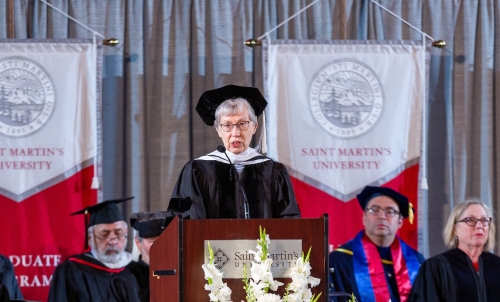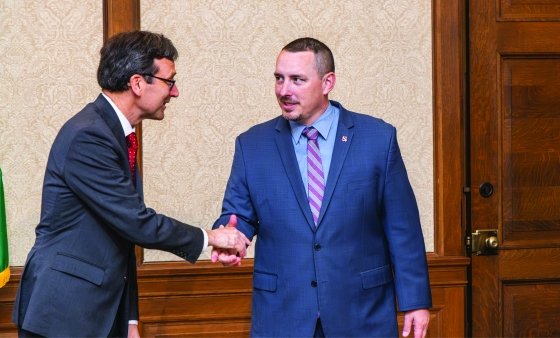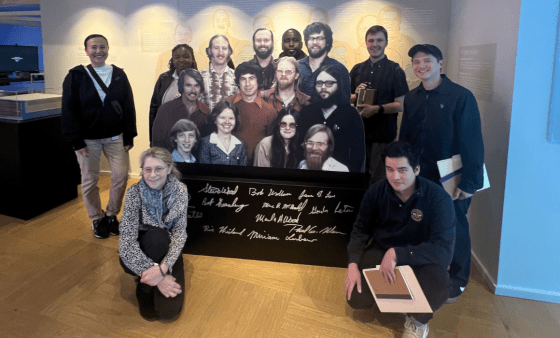A More Sustainable Medicine

"If all you do is teach what’s in the textbook, that is information gathered by someone else. Let’s just do the new stuff. It’s a lot more fun to make it than talk about it."
- Angela Hoffman ‘72
- Secondary education
- Class of 1972
Sometimes the ingredients for cancer therapy are rooted in the earth. Driven by her passion for biochemistry, Saint Martin’s alumna Angela Hoffman ’72 found paclitaxel, the active chemical of the anticancer drug Taxol®, in a surprising place: hazelnut trees. Sr. Angela Hoffman was also awarded an honorary degree from Saint Martin's in 2022.
An unexpected discovery
Angela Hoffman ’72, a biochemistry professor at the University of Portland, was not thinking cancer when she began to study hazelnut trees in 1992. She was originally looking for a way to combat a plant disease known as Eastern Filbert Blight. When Hoffman conducted a chemical analysis of the hazelnut tree extract, she discovered that one of the chemicals was paclitaxel: the active chemical of the anticancer drug Taxol®.
Prior to Hoffman’s discovery, paclitaxel had primarily been found in yew trees—slow-growing trees which are planted and harvested on a mass scale and stripped of their bark every 8-10 years. Although this process yielded high amounts of paclitaxel, it had a damaging effect on the natural environment. Curious, Hoffman began to wonder if hazelnut trees could provide a more sustainable approach
When she tried to publish her research, the biochemistry community was skeptical at first. “It was hard to find a publisher,” she recalls. However, the response improved when researchers in Chile, Turkey and other countries replicated her study and produced the same results. Hoffman was suddenly at the forefront of research on paclitaxel. Since then, her research paper has been cited 60-80 times by scientists following in her footsteps.
The right wrong order
Hoffman’s passion for biochemistry can be traced back to her undergraduate days at Saint Martin’s. While her major was Education, Hoffman also worked in the biology department and learned how to maintain the lab equipment and to identify plants, fueling her passion for biochemistry. At Saint Martin’s, she also learned to think critically and ask her own questions. “Not being at a really big school is a giant plus,” she reflects. “You’re the focus of your professors and nobody else is going to do your work for you. You have to do it.” After Saint Martin’s, she went on to earn a master’s degree and a second bachelor’s degree from Pacific Lutheran University. Eventually, she earned a Ph.D. in Biochemistry from the Oregon Graduate Institute of Science and Technology. “I did everything in the wrong order,” she explains with a laugh.
In pursuit of new things
Hoffman has taught at the University of Portland for over 25 years. Her research on paclitaxel earned her the University of Portland’s Award for Scholarship. She continues to run experiments on plants, including dahlias, rose petals and camellias. Her findings still surprise her. For instance, she found that red peonies produce an extract that stops enzymes that would have prevented remyelination of cells (the coating around the outside of nerves). In addition to her botanical studies, she is researching ways that developing countries can improve their screening process, to see if they have good candidates for killing cancer cells.
“It’s really cool to learn new things,” she reflects. “If all you do is teach what’s written in the textbook, that is information gathered by someone else and it’s 5-10 years old. Let’s just do the new stuff. It’s a lot more fun to make it than talk about it.”
Saint Martin's experience
Leading the way
Hoffman was a trailblazer in more ways than one. When she attended Saint Martin’s in the 1970s, she was one of a handful of female students in her biology classes. “It just wasn’t what girls did,” she explains.
A life of service
With a National Science Foundation grant, Hoffman returned to Saint Martin’s in 1983 to lead a summer workshop for teachers in the Lacey/Olympia area who lacked training in chemistry.
Educational Studies
Educational studies at Saint Martin's is a non-certification program for individuals interested in gaining knowledge, skills and pedagogy in education theory and application. The program offers five areas of focus: Community education; Early childhood education; Foundation studies in education and culture; Health and fitness; STEM (science, technology, engineering, math).
- Campus
-
- Main (Lacey)
- Type of Instruction
-
- In Person
- Degree
-
- Bachelor of Arts



